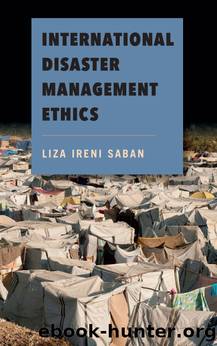International Disaster Management Ethics by Liza Ireni Saban

Author:Liza Ireni Saban [Saban, Liza Ireni]
Language: eng
Format: epub
Tags: Technology & Engineering, Philosophy, Ethics & Moral Philosophy, Social Science, Disasters & Disaster Relief, Emergency Management
ISBN: 9781438461717
Google: BiMuDQAAQBAJ
Goodreads: 30154560
Publisher: SUNY Press
Published: 2016-01-01T10:14:59+00:00
6
Corruption
Humanitarian assistance aims to save lives and alleviate the suffering of people in times of crisis. Yet these noble ambitions do not immunise emergency responses from corrupt abuse.
âTransparency International 2010, viii
In disaster events, humanitarian aid involves large amounts of cash and supplies that may create opportunities for corruption, especially in developing or corrupt countries. This chapter discusses the way corruption in the allocation of aid undermines the moral obligation behind humanitarian assistance, leading to inequitable and ineffective distribution of disaster relief and reconstruction aid. More specifically relevant to the context of global distributive justice, corruption occurring within disaster-affected countries may push donors to cut back on their aid funding. The threat of waste and corruption by disaster-affected governments poses distributive consequences, particularly reputational consequences for domestic agencies, and a decline in aid funding for lack of the authority to convincingly deliver international aid to those in need. Corruption risks may undermine international funding for disaster mitigation efforts in the donor country, with taxpayers being legitimately concerned that their funds are being stolen rather than assisting disaster-affected citizens.
Corruption is defined as the âmisuse of public power for private gainâ (Dobel 1978, Nye 1967, 419). Such a definition of corruption includes legal, illegal, and borderline actions, which can allow the legal system to enforce sanctions for unethical action. However, if a society defines certain behaviors as not corrupt, but the legal system defines them as corruption, the legal system will be unable to enforce legal standards of ethical behavior. Thus, an alternative definition of corruption based on public opinion perspective has been suggested by Heidenheimer (Heidenheimer 2002, Heidenheimer et al. 1989). The Heidenheimer definition of corruption has the advantage of being conceived in social terms as what the publicâin any given societyâsees as being corrupt. The indicator for corruption is deviation from the law, which serves as the value guiding the legislators and judicial elite. This perception plays a part in public opinion regarding political corruption. In order to bring the subject of corruption to public awareness, Transparency International (TI), the largest worldwide organization comparing levels of corruption, publishes annually the âCorruption Perception Index.â This index determines the level of corruption in each country based on the perceptions of businessmen, academics, and foreign and local risk-analysts. According to this definition, the level of corruption of a certain act is determined by the result of the combined judgment of the elite and the general public.
Alternative definitions of corruption has been suggested by Kurer (2005) and Rothstein and Teorell (2008). Their definition is broadened to include violations of professional norms and ethics, compared to the narrower legal and public opinion definition of corruption. According to Kurer (2005, 230) and Rothstein and Teorell (2008), corruption âinvolves a holder of public office violating the impartiality principle in order to achieve a private gain.â Such a definition is based on an ethical-normative approach that addresses the role of professional ethics and guides elected officialsâ practice. In general, the purpose of each profession is to promote a particular,
Download
This site does not store any files on its server. We only index and link to content provided by other sites. Please contact the content providers to delete copyright contents if any and email us, we'll remove relevant links or contents immediately.
The European Opportunity by Felipe Fernández-Armesto(569)
The European History Highway: A Guide to Internet Resources by Dennis A. Trinkle Scott A. Merriman(535)
Morgan Kaufmann Digital Watermarking and Steganography by Ingemar Cox Matthew Miller Jeffrey Bloom Jessica Fridrich Ton(528)
The Seven Wonders of the Ancient World by Michael Denis Higgins(521)
Hyperculture by Byung-Chul Han(509)
European Security in a Global Context by Thierry Tardy(505)
European Security without the Soviet Union by Stuart Croft Phil Williams(505)
The Routledge companion to Christian ethics by D. Stephen Long Rebekah L. Miles(498)
Get Real with Storytime by Julie Dietzel-Glair & Marianne Crandall Follis(443)
Hudud Al-'Alam 'The Regions of the World' - a Persian Geography 372 A.H. (982 AD) by V. V. Minorsky & C. E. Bosworth(436)
Gorbachev And His Generals by William C. Green(428)
Tibetan Studies in Comparative Perspective by Chih-yu Shih Yu-Wen Chen(427)
Governance, Growth and Global Leadership by Espen Moe(418)
How Languages Are Learned 5th Edition by Patsy M Lightbown;Nina Spada; & Nina Spada(407)
CliffsNotes on Fitzgerald's The Great Gatsby by Kate Maurer(400)
The Oxford History of the World by Fernández-Armesto Felipe;(388)
The Egyptian Economy, 1952-2000 by Khalid Ikram(379)
Oral Poetry and Narratives from Central Arabia: The Poetry of Ad-Dindan : A Bedouin Bard in Southern Najd (Studies in Arabic Literature, Vol 17) (English and Arabic Edition) by P. M. Kupershoek P. Marcel Kurpershoek(365)
The Oxford Handbook of the Incas by Sonia Alconini(364)
